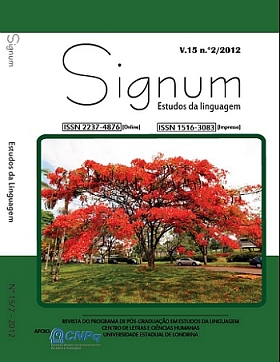Supportive beliefs: why should teachers understand their nature and role?
DOI:
https://doi.org/10.5433/2237-4876.2012v15n2p45Palabras clave:
Beliefs in action. Beliefs cognitive role. Supportive beliefs.Resumen
Assuming the demands of educating teachers for classroom practice, it is high time researchers investigated beliefs in action deeper. Rokeach's (1968) concepts of central and peripheral values as gradient for discussing and defining the nature of beliefs, among the contribution of others, have provided Applied Linguistics with a gateway to study the dynamics of belief change. Framed by these studies and the results of a doctoral study on autonomy development, this paper aims at acknowledging a third element into the gradient: supportive beliefs, which for their content, nature and role in human cognition refer to beliefs that cannot be considered peripheral. We present evidence that some currently considered peripheral beliefs are, in fact, supportive beliefs, whose existence protects central beliefs from being banned from cognition whenever challenged. Data to support such claim were collected from a written narrative and a series of five interviews with a 45 year-old woman, taking an intermediate level English course in Brazil, as part of a larger case study. During the interviews, some of this woman's beliefs were challenged. We discuss how she defended, maintained, modified or totally discarded them and refer to the difficulty of changing beliefs due to their emotional and/or cognitive relevance.Descargas
Descargas
Publicado
Cómo citar
Número
Sección
Licencia
Derechos de autor 2025 Maria Raquel Bambirra, Laura Miccoli

Esta obra está bajo una licencia internacional Creative Commons Atribución-NoComercial-SinDerivadas 4.0.
Signum: Estudos da linguagem, publica seus artigos licenciados sob a Licença Atribuição-NãoComercial-CompartilhaIgual 4.0 Internacional. Esta licença permite que terceiros façam download e compartilhem os trabalhos em qualquer meio ou formato, desde que atribuam o devido crédito de autoria, mas sem que possam alterá-los de nenhuma forma ou utilizá-los para fins comerciais. Se você remixar, transformar ou desenvolver o material, não poderá distribuir o material modificado.

















